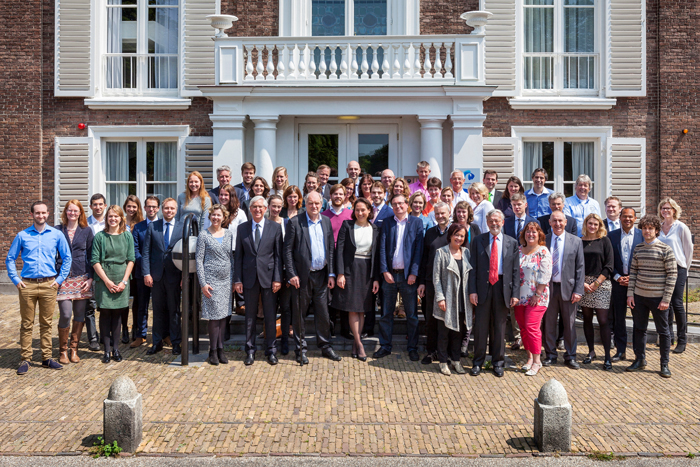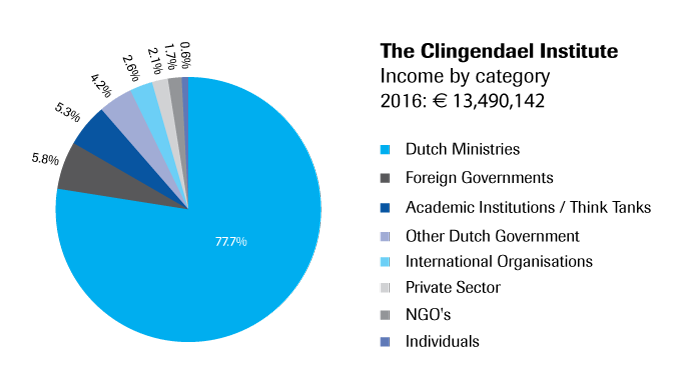
Clingendael’s Corporate Staff
Communications
The Clingendael Institute intensified its outreach strategies through a more proactive (online) approach towards public sector, NGOs, media and other stakeholders. This was reflected in the increased outreach of both the Clingendael Institute’s research and training work. The effect of social media was further increased, partly by reintroducing Facebook.
| Key figures |
2015 |
2016 |
|---|---|---|
| Media appearances |
529 |
650 |
| Clingendael Newsletter (subscriptions) |
4,400 |
5,292 |
|
||
| Twitter (followers) |
6,247 |
7,383 |
| LinkedIn (followers) |
5,921 |
6,969 |
| Facebook (followers) |
Not applicable |
3,298 |
| Website traffic through social media |
6.8% |
9.8 % |
In addition to the public sector and NGOs, the Institute also increasingly targets the private sector.
The Communications unit made the online publications more accessible by further developing the so-called ‘web pubs’ (online reports), and by introducing longreads, animations and interactive infographics. Overall, visitors to our website (335,140) spent more time reading our content, with an increase of 5.8%. We also embarked on preparations for a new, more marketing-driven website, which will be launched in 2017.
Clingendael started distributing its publications through online academic platforms, such as JSTOR, ResearchGate and Columbia International Affairs Online (CIAO).
The Clingendael Communications desk offered internships for students in 2016.
Human Resources
The Clingendael Institute continued to grow in 2016. Its number of employees rose from 85 on 31 December 2015 to 97 on 31 December 2016. A total of 33 university students also completed their internship at the Institute. Since 1 December 2016, the Personnel & Organisation (P&O) department has consisted of two part-time human resources (HR) advisors. This doubling of the staff was necessary to accommodate the organisation’s growth. The Clingendael Institute also aims to invest more in its employees, which requires sufficient capacity in a professional P&O policy and support.
Payroll administration and associated HR processes were further automated in 2016. This is expected to deliver time savings in 2017. A risk assessment was conducted at the end of 2016, the results and recommendations of which are being implemented during 2017. Eight employees took part in training in 2016 to prepare for travel to high-risk areas. The Institute’s policy and internal agreements with regard to such travel are operational and will be formalised in 2017. Our emergency response team took part in a refresher course.
The Clingendael Institute commissioned an employee survey in April 2016. Its results were discussed in the management team and with the employees. Clingendael’s employees are proud of the organisation for which they work and the work that they do. Their work energises them. The key points they mentioned in the survey are internal communication, development and growth potential, and clarity with regard to the organisation’s objectives.
Work started in 2016 on the adaptation and modernisation of the Institute’s employment conditions (General Regulations on Clingendael Employment Conditions and the Guide to Schemes applicable to Clingendael). This is consistent with Clingendael’s more arm’s length positioning in relation to the Dutch government from 1 January 2017. Intensive consultations took place for this purpose with the Works Council. The aim is that, with the Works Council’s consent, both schemes will come into force in 2017.
The Clingendael Institute once again advertised a large number of vacancies in 2016. Vacancies are usually advertised by means of announcements on our website, on social media such as Facebook, Twitter and LinkedIn, and through our own network. Of the 35 vacancies in 2016, 16 were for internships and 19 were for regular posts.
| Overview of personnel in 2016 |
|
|---|---|
| Total number of employees (1-1-2017 ) |
97 |
| New employees hired |
29 |
| Total number of departing employees |
18 |
| Employees on indefinite-term contracts (1-1-2017) |
47 |
| Employees on fixed-term contracts (1-1-2017) |
50 |
| Male/female ratio |
44/53 |
Finances
The financial result for 2016 was a profit of €25,358. This is entirely in line with the budget but markedly less than in 2015. The turnover was almost €400,000 more than in 2015 yet also €400,000 less than budgeted. The average number of staff rose by 12 FTE to 92 FTE. Due to this, personnel costs rose by €1,000,000 with respect to 2015.
In 2016, much time was occupied successfully acquiring new projects for 2017. Due to this, the nett income was less than expected. In 2017 also, it will be difficult to achieve the nett income budgeted for. A loss is therefore expected.
The new statutory relationship with the Netherlands Ministries of Foreign Affairs and Defence has not yet been realised. This is expected to happen as of 31 December 2017. The basic subsidy did end as of 1 January 2017. In place of this, Clingendael receives a financial contribution to initiate and conduct the public debate on foreign policy for the coming four years. This contribution is €800,000 per year.
Besides the financial support for this public platform, the Institute also acquired funding from the so-called PROGRESS-tender with a maximum of € 1,5 million per year (2017-2020). As of 2017 Clingendael also receives multi-annual funding for inter alia it’s research on conflict and fragility (Conflict Research Unit), the Knowledge Platform Security & Rule of Law and a new facility focused on frontline negotiations.
|
|
2014 |
2015 |
2016 |
|---|---|---|---|
Funding Type |
|||
|
Projects |
€8.5 M |
€12.0 M |
€12.4 M |
| Core funding (Dutch MFA and MOD) |
€1.2 M |
€1.1 M |
€1.1 M |
Costs |
|||
| Staff costs |
€4.6 M |
€5.2 M |
€6.2 M |
| Corporate costs |
€1.1 M |
€2.3 M |
€1.6 M |
| Project costs |
€3.0 M |
€5.0 M |
€5.7 M |
| Result (profit) |
€1,003,000 |
€636,700 |
€25,000 |

An overview of all clients and income can be found here.
